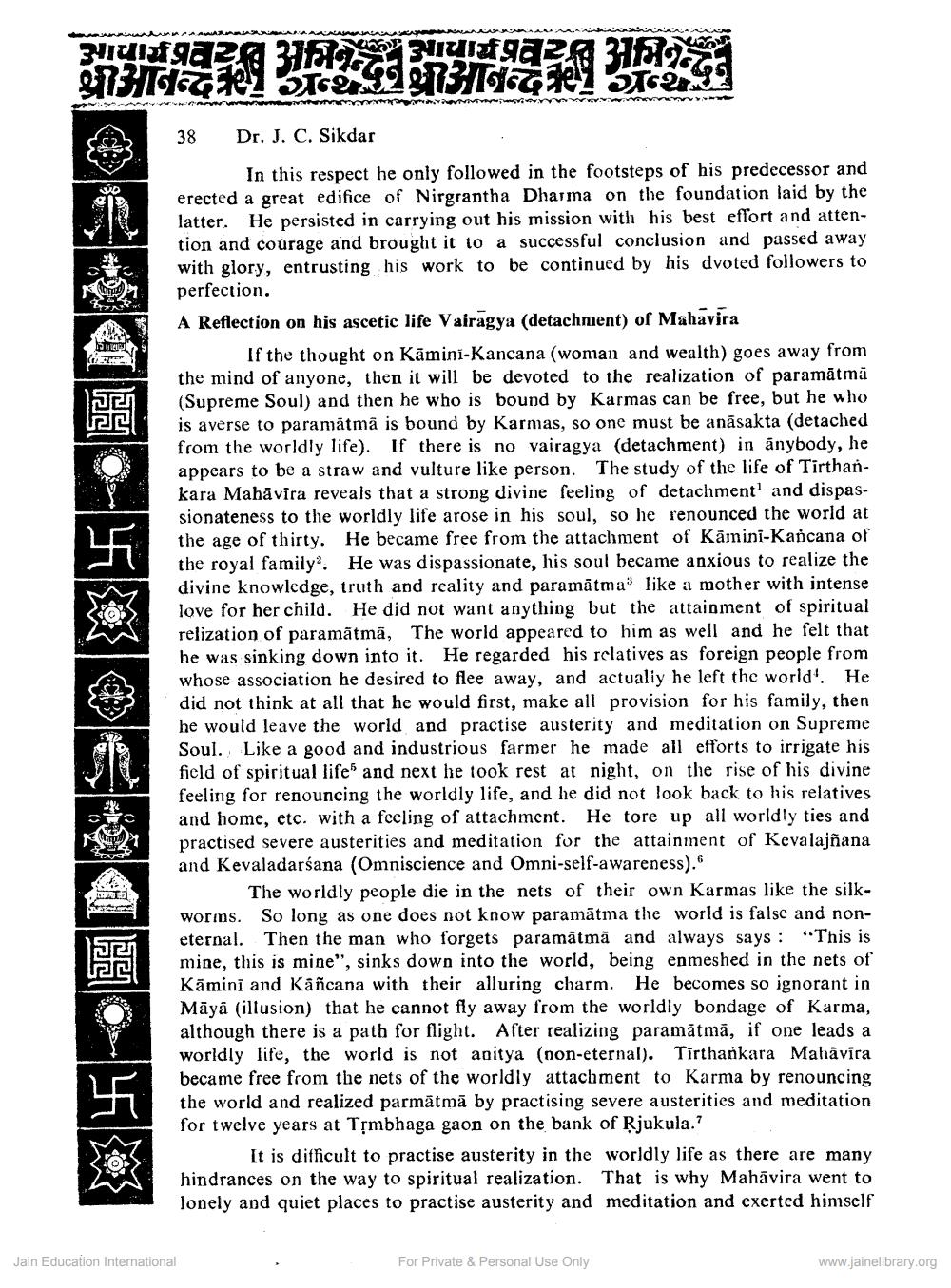Book Title: Reflection on the Life of Mahavira Author(s): J C Sikdar Publisher: Z_Anandrushi_Abhinandan_Granth_012013.pdf View full book textPage 2
________________ સાવાડા 310043 श्री आनन्द अन्थ श्री आनन्द 九 Te M Buyaa1 310 38 Dr. J. C. Sikdar In this respect he only followed in the footsteps of his predecessor and erected a great edifice of Nirgrantha Dharma on the foundation laid by the latter. He persisted in carrying out his mission with his best effort and attention and courage and brought it to a successful conclusion and passed away with glory, entrusting his work to be continued by his dvoted followers to perfection. A Reflection on his ascetic life Vairagya (detachment) of Mahavira If the thought on Kamini-Kancana (woman and wealth) goes away from the mind of anyone, then it will be devoted to the realization of paramātmā (Supreme Soul) and then he who is bound by Karmas can be free, but he who is averse to paramātmā is bound by Karmas, so one must be anasakta (detached from the worldly life). If there is no vairagya (detachment) in anybody, he appears to be a straw and vulture like person. The study of the life of Tirthankara Mahāvīra reveals that a strong divine feeling of detachment1 and dispassionateness to the worldly life arose in his soul, so he renounced the world at the age of thirty. He became free from the attachment of Kamini-Kancana of the royal family. He was dispassionate, his soul became anxious to realize the divine knowledge, truth and reality and paramätma like a mother with intense love for her child. He did not want anything but the attainment of spiritual relization of paramātmā, The world appeared to him as well and he felt that he was sinking down into it. He regarded his relatives as foreign people from whose association he desired to flee away, and actually he left the world'. He did not think at all that he would first, make all provision for his family, then he would leave the world and practise austerity and meditation on Supreme Soul. Like a good and industrious farmer he made all efforts to irrigate his field of spiritual life" and next he took rest at night, on the rise of his divine feeling for renouncing the worldly life, and he did not look back to his relatives and home, etc. with a feeling of attachment. He tore up all worldly ties and practised severe austerities and meditation for the attainment of Kevalajñana and Kevaladarsana (Omniscience and Omni-self-awareness)." Jain Education International अन्थश The worldly people die in the nets of their own Karmas like the silkworms. So long as one does not know paramātma the world is false and nonThen the man who forgets paramâtmã and always says: "This is mine, this is mine", sinks down into the world, being enmeshed in the nets of Kamini and Kancana with their alluring charm. He becomes so ignorant in Maya (illusion) that he cannot fly away from the worldly bondage of Karma, although there is a path for flight. After realizing paramätmã, if one leads a worldly life, the world is not anitya (non-eternal). Tirthankara Mahāvīra became free from the nets of the worldly attachment to Karma by renouncing the world and realized parmatma by practising severe austerities and meditation for twelve years at Trmbhaga gaon on the bank of Rjukula." It is difficult to practise austerity in the hindrances on the way to spiritual realization. lonely and quiet places to practise austerity and For Private & Personal Use Only worldly life as there are many That is why Mahavira went to meditation and exerted himself www.jainelibrary.orgPage Navigation
1 2 3 4 5 6 7 8 9 10 11 12 13 14 15
